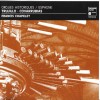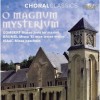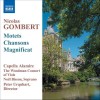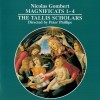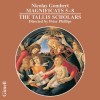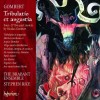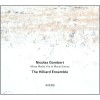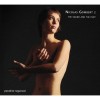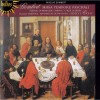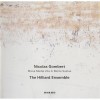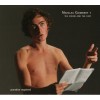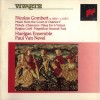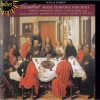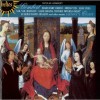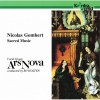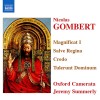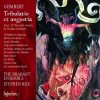| Country: | France |
| Period: | Renaissance |
Biography
Nicolas Gombert (c. 1495 – c. 1560) was a Franco-Flemish composer of the Renaissance. He was one of the most famous and influential composers between Josquin des Prez and Palestrina, and best represents the fully developed, complex polyphonic style of this period in music history.
Details of his early life are sketchy, but he was likely born around 1495 in southern Flanders, probably between Lille and Saint-Omer, possibly in the town of La Gorgue. German writer and music theorist Hermann Finck wrote that Gombert studied with Josquin; this would have been during the renowned composer's retirement in Condé-sur-l'Escaut, sometime between 1515 and 1521.[4]
Gombert was employed by the emperor Charles V as a singer in his court chapel in 1526 and possibly as a composer as well. Most likely he was taken on while Charles was passing through Flanders, for the emperor traveled often, bringing his retinue with him, and picking up new members as he went. A document dated 1529 mentions Gombert as magister puerorum ("master of the boys") for the royal chapel.[4] He and the singers went with the emperor on his travels throughout his holdings, leaving records of their appearances in various cities of the empire. These visits were musically influential, in part because of Gombert's stature as a musician; thus the travels of Charles and his chapel, as did those of his predecessor Philip I of Castile with composer Pierre de La Rue, continued the transplantation of the Franco-Flemish polyphonic tradition onto the Iberian Peninsula.[1] At some point in the 1530s Gombert became a cleric and probably a priest; he received benefices at several cathedrals, including Kortrijk, Lens, Metz, and Béthune.[4] He remained in the Imperial chapel as maitre des enfants ("master of the children") until some time between 1537 and 1540, being succeeded by Thomas Crecquillon and later Cornelius Canis. Even though he held the position of maitre des enfants at the Imperial chapel, he never officially received the title of maitre de chapelle – music director – which was a title given to both Adrien Thibaut and Thomas Crecquillon.[4] While serving in this position, he likewise unofficially held the position of court composer, arranging numerous works commemorating the key happenings during Charles V's life.[4]
In 1540 during the height of his career, he vanished from chapel records.[1] According to contemporary physician and mathematician Jerome Cardan, writing in Theonoston (1560), in 1540 Gombert was convicted of sexual contact with a boy in his care and was sentenced to hard labor in the galleys.[4] The exact duration of his service in the galleys is not known, but he was able to continue composing for at least part of the time.[1] Most likely he was pardoned sometime in or before 1547, the date he sent a letter along with a motet from Tournai to Charles' gran capitano Ferrante I Gonzaga.[4] The Magnificat settings preserved uniquely in manuscript in Madrid are often held to have been the "swansongs" that according to Cardan won his pardon; according to this story, Charles was so moved by these Magnificat settings that he let Gombert go early. An alternative hypothesis (Lewis 1994) is that Cardan was referring to the highly penitential First Book of four-part motets; however, in neither case is it clear how Gombert was able to compose while rowing in the galleys as a prisoner.[4]
It is not known how long Gombert lived after his pardon or what positions, if any, he held; his career faded into relative obscurity after he was freed. He may have retired to Tournai, spending the final years of his life as canon there.[4] Bracketing dates for his probable death are 1556 and 1561; in the former year Hermann Finck mentioned that he was still living, and in 1561 Cardan wrote that he was dead, without giving details.
Gombert is perhaps the most representative composer of the generation between Josquin and Palestrina, especially in the area of sacred music. He brought the polyphonic style to its highest state of perfection; if imitation is a common device in Josquin, it is pervasive in Gombert.[4] Extended homophonic passages are rare in his sacred works, and he is particularly fond of imitation at very close time intervals, a technically very difficult feat (although he only rarely wrote strict canon).[5] He preferred the lower voice ranges, and instead of the four voices which was usual at the time, he preferred larger groupings, such as five and six voice parts.[4] Gombert, unlike his predecessor and mentor, Josquin des Prez, used irregular numbers of voice entries and avoided precise divisions of phrases. Syncopations and cross-accents are characteristic of his rhythmic idiom, and harmonically, Gombert's compositions stressed the traditional modal framework. Musica ficta, a term that refers to chromatically altering pitches, was very prominent in his musical stylings.[4] His music is notable for its use of suspended dissonance, as well as featuring many false relations.[5] Dissonance he uses for expressive effect, for example as an expression of grief in his six-voice motet on the death of Josquin, Musae Jovis, with its clashing semitones, and occasional root-position triads a tritone apart.[4]
Out of the ten masses that Gombert composed, nine survive complete. Chronologically, the mass sequence is not specified, but an approximate chronology can be deduced from stylistic characteristics. Two musical characteristics, sequence and ostinato, that were rare in Gombert’s later works, are present in his earlier masses Quam pulchra es and Tempore paschali.[4]
The motet was Gombert's preferred form, and his compositions in this genre not only were the most influential part of his output, but they show the greatest diversity of compositional technique.[4] His motets, alongside those of Adrian Willaert and Jacobus Clemens non Papa, stand out from the rest of the Flemish motet composers.[1] Familiar characteristics of motets of the preceding generation, such as ostinato, canon, cantus firmus, and double texts, are unusual in Gombert's style, excepting where he used aspects of the previous generation's style as an homage, such as in his motet on the death of Josquin, Musae Jovis.[4] When considering texts for his motets, Gombert obtained his inspiration from scripture – such as the Psalms – as opposed to the liturgy of the Roman Catholic church.[4] He was less attentive to textual placement and clarity than to the overall expressive sonority.[6]
Gombert's eight settings of the Magnificat, the ones that may have won him his pardon, are among his most famous works. Each is written in one of the church modes, and consists of a cycle of short motets, with the individual motets based on successive verses of the Magnificat text.[4]
Some of Gombert's works are for unusually large vocal ensembles, including 8, 10, and 12 voices. These works are not polychoral in the usual sense, or in the manner of the Venetian School in which the voices were spatially separated; rather, the voice sub-groupings change during the pieces. These large ensemble compositions include an eight-voice Credo, the 12-voice Agnus from the Missa Tempore paschali, and 10- and 12- voice settings of the Regina caeli.[4] In comparison with the northern Italian cori spezzati style, Gombert’s multi-voice works were not antiphonal.[4] Instead of dividing forces consistently, Gombert frequently changed the combinations of voice groups.[4] These vocal pieces contained more direct repetition, sequence and ostinato than his other music.[4]
His secular compositions – mostly chansons – are less contrapuntally complex than his motets and masses, but nonetheless more so than the majority of contemporary secular pieces, especially the 'Parisian' chanson. Gombert during the middle of the sixteenth century received credit for several of the Parisian chansons, but later studies have discovered that he was not the sole 'Nicolas' of those secular pieces but many were actually by Nicolas de la Grotte or Guillaume Nicolas.[4] Authors of the texts used in many chansons, a genre in which Gombert excelled, were mostly anonymous. He turned to older older verse, often of a folkish type, with typical subject matter including unhappy love, farewells, separations, infidelities and the like.[4] Many of these chansons appeared in lute and vihuela arrangements, with their wide geographical distribution showing their immense popularity.
His surviving works include 10 masses, about 140 motets, about 70 chansons, a canción (probably written when he was in Spain), a madrigal, and a handful of instrumental pieces.
Gombert was one of the most renowned composers in Europe after the death of Josquin des Prez, as can be seen by the wide distribution of his music, the use of his music as source material for compositions by others, and the singular attention that printers paid to him (issuing, for example, editions of his works – most print editions at the time were anthologies of music by several composers).[4] Although highly admired by his contemporaries, the next generation of Franco-Flemish composers mostly wrote in a more simplified style. Part of this was an inevitable stylistic reaction to a contrapuntal idiom which had reached an extreme, and part of this was due to the specific dictates of the Council of Trent, which required that text be clearly understandable in sacred, especially liturgical, music – something which is next to impossible for a composer to achieve in a dense imitative texture.[7]
While most composers of the next generation did not continue to write vocal music using Gombert's method of pervasive imitation, they continued to use this contrapuntal texture in instrumental works. Forms such as the canzona and ricercar are directly descended from the vocal style of Gombert; Baroque forms and processes such as the fugue are later descendants. Gombert's music represents one of the extremes of contrapuntal complexity ever attained in purely vocal music.







